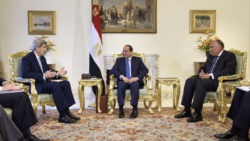Qatar to deposit $1 billion in Sudan’s Central Bank
The Qatari government has agreed to deposit $1 billion with Sudan’s Central Bank (CBoS) to support the economic reform measures and cover balance of payments’ deficit, according to a newspaper report.
Last year Qatar announced that it will inject $2 billion of investments in Sudan including “the purchase of government bonds issued by the Sudanese government and investments in different sectors particularly mining, oil, agriculture and services”.
Qatar has been one of the few countries where Sudan enjoys relatively warm relations with. For years the rich Arab Gulf state has hosted peace talks between the Sudanese government and Darfur rebel groups which eventually resulted in signing of a peace accord in 2011.
Report however indicates that only $500 Million out of the $2 billion promised by Doha were actually disbursed. Informed sources said that the central bank will receive the deposit within the coming few days, saying that it will help stabilize exchange rates and curb the rise of dollar price in the black market and mobilize productive sectors.
The same sources predicted that dollar price, which is now trading at 8 Sudanese pound on the black market, will fall below 7 pounds. It also pointed that Sudan received a total of $2.5 billion last year including a Qatari deposit of $2 billion with Sudan’s central bank to be repaid within 4 years, $200 million from China, and $300 million from Libya.
This is not the first time the government made such announcements on external Forex help which allowed for temporary reprieve for the Sudanese pound on the black market.
Some observers accuse the government of deliberately feeding false news on Forex receipts in a bid to scare the black market into selling its Forex holdings to ease pressure on the local currency.
Last year a senior CBoS official told Sudan Tribune that he had no knowledge of a government disclosure that a cash transfer was made to Khartoum by a neighboring country.
Khartoum is under pressure to preserve the eroding value of its currency in the wake of the secession of the oil-rich South Sudan in July 2011.
Last month, the Sudanese government launched a new austerity package which included lifting fuel subsidies which almost doubled prices of gasoline and diesel. The cabinet also raised the US dollar exchange rate for importing purposes to 5.7 pounds compared to an official rate of 4.4.
Critics say that this measure along with the declining value of the pound will only fuel any already high inflation rate.


